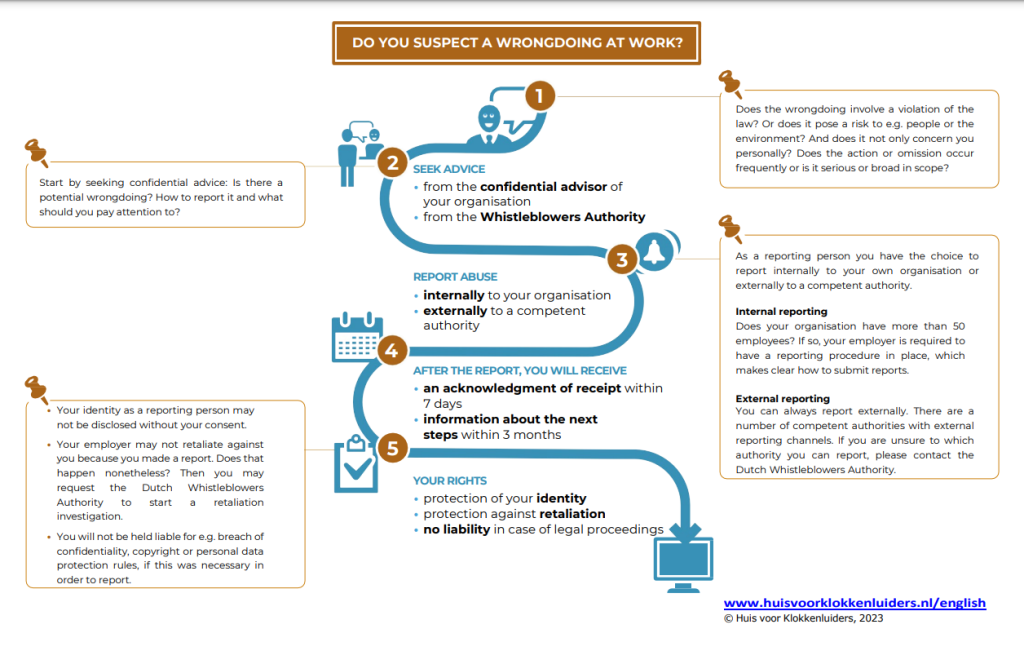Does your company have more than 50 employees? If so, you are required to implement a whistleblower policy as a part of your internal reporting procedure. Whistleblowers play a pivotal role in organizations by exposing and reporting ‘wrongdoing’ within the workplace. It helps promote transparency, accountability, and ethical behaviour. The EU Whistleblowing Directive and the Whistleblower Protection Act protect people who come forward with information about wrongdoing.
This year, the Dutch government instituted several changes to the whistleblower policy, making it more widely applicable to companies in the Netherlands. That’s why this article is going to describe the fundamentals of the Whistleblower Protection Act, why it’s important, and what companies need to know about it. If you company needs support developing a Whistleblower Policy, get in touch with one of our experts.
What is a Whistleblower protection policy in the Netherlands, and why is it important?
In 2019, Directive (EU) 2019/1937 of the European Parliament, commonly known as the ‘EU Whistleblowing Directive’ was enforced for EU Member States to implement the rights and obligations of whistleblowers in national law. As a part of the union, the Netherlands is obliged to follow EU law and implemented the Whistleblower Protection Act (Wet bescherming klokkenluiders, Wbk) on 18 February 2023, replacing the previous Whistleblowers Authority Act (Wet Huis voor klokkenluiders, Wet HvK).
This Whistleblower Protection Act mandates that a company with more than 50 employees must maintain an internal reporting channel, monitor, and act, on filed reports while keeping the whistleblower’s identity anonymous. It also offers protections against retaliation actions. Below is the summary.
For whom?
Any company located or registered in the Netherlands who employ 50 – 249 employees.
What is the scope of whistleblowing reports?
- Wrongdoing against the public interest
- Violation of EU law
- Unethical professional behaviour in the context of work-related
Who is protected under the Whistleblower Protection Act?
- Current and former employees
- Directors
- Freelancers
- Contractors
- Shareholders
- Suppliers
- Trainees
- Interns (paid or unpaid)
- Volunteers
- Job applicants
- Third parties such as colleagues or relatives who could be affected by disclosed information
What is protected under the Whistleblower Protection Act?
- Suspension, termination of contract or dismissal
- Demotion or withholding of promotion
- Transfer of duties, work location changes
- Negative reference on performance
- Imposing penalties or disciplinary measures
- Harm of the whistle-blower’s reputation, especially in social media
- Cancellation or termination of a contract for goods or services
Please note that the burden of proof is on the employer who has to prove that the disadvantage suffered from the reporter is not related to the reporting.
What are required for a company?
- Establish an internal reporting channel
- Define reportable wrongdoing
- Appoint an officer or a department to monitor and manage files
- Provide a copy of acknowledgement within 7 days of receiving a report
- Provide feedback on the submitted report within 3 months
- Communicate with employees about the reporting system
- Protect anonymity of the whistleblower and comply with GDPR
Integrity policy
Having an integrity policy before implementing a whistleblower policy is important as it sets the foundation for ethical conduct establishing the values, principles, and expected behavior of employees. A whistleblower policy provides a formal mechanism for employees to report any unethical or illegal activities without fear of retaliation. It complements the integrity policy by offering a specific process for addressing concerns and ensuring that the company remains accountable.
Reporting procedure with the Dutch Whistleblower Protection Act

Reports can be made directly to external authorities without the requirement to report internally. This means that the lack of internal reporting channels or an unreachable system may lead to a reporter to go outside the company to report. It is important not only to have a whistleblower policy but also implement and communicate about it with your employees to promote transparency and regulatory compliance within the company. Moreover, don’t forget to implement an integrity policy and review it when necessary. An integrity policy outlines the expectations and standards for ethical behavior and honesty within the workplace. It serves as a guide for employees to maintain integrity in their actions, fostering a trustworthy and transparent work environment.
Now that the whistleblower protection act has been expanded to include more companies in the Netherlands, it is likely that your company will need to develop a whistleblower policy too. If you want to learn more about what this means for your internal reporting policy, or just need support developing it, please get in touch with one of our experts.

Five Key Elements Recruiters Seek When Reviewing a Resume
26-07-24
Crafting a standout resume/CV that captures a recruiter’s attention in the Netherlands can be a unique challenge. If you’re aiming to make a memorable impression, this guide is here to help. Whether you’re a seasoned professional or a newcomer to ...

Navigating Holiday Allowance and Time-Off Policies in the Netherlands
18-07-24
Summer is here in the Netherlands, which means everybody is preparing their out-of-office messages for their holidays! It is also the time of year businesses really review their time-off policies in the Netherlands. Although employers in the Netherlands are required ...

EXPLAINED: Sustainable Employment and its Core Elements
12-07-24
What is Sustainable Employment? Sustainable employment is creating and maintaining jobs that are stable, fulfilling, and capable of bearing economic and social changes. It is the commitment to long-term job security, fair wages, and healthy working conditions while supporting employees’ ...

Why the decision matters: the difference between EOR and payroll
28-06-24
Employer of Record (EOR) services and payroll services are two approaches businesses can utilise to manage their workforce. They are key resources that can be used when looking to expand into a new market.

EXPLAINED: Employer of Record (EOR) Services
20-06-24
Expanding to a new market is an exciting time for any business. There is plenty of opportunities in the Netherlands, but also plenty of room for risk and costs. One way to mitigate some of this risk, while also taking ...

Orientation year 2024: guide for international graduates in the Netherlands
14-06-24
An Orientation Year (or zoekjaar, in Dutch) is what allows international students to live and search for a job in the Netherlands for up to 12 months.

Navigating recruitment in the age of AI
30-05-24
AI is changing how companies find and hire people. AI tools make recruiting faster and more efficient, taking over tasks that used to take a lot of time and effort. But using AI in hiring also comes with challenges. In this post, we’ll look at the pros and cons of using AI in recruitment.

EXPLAINED: Works councils in the Netherlands
08-05-24
Are you familiar with the ‘Works Council’ for businesses in the Netherlands? A works council in the Netherlands is probably the most important representative body of employee interests for a company. A works council (in Dutch: ondernemingsraden, OR) is made ...
